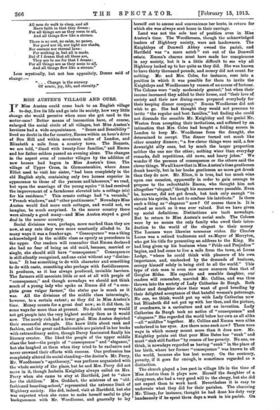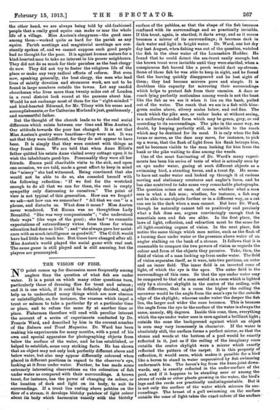MISS AUSTEN'S VILLAGE AND OURS.
IF Miss Austen could come back to an English village to-day, live its life and go into its society, how very little change she would perceive when once she got used to the
motor-ears ! Better means of locomotion have, of course, enlarged the social circle of all villages, but Miss Ansten's heroines had a wide acquaintance. " Sense and Sensibility" lived no doubt in the far country, Emma within an hour's drive of Box Hill and within seventeen miles of London, and Elizabeth a mile from a country town. The Bennets, we are told, "dined with twenty-four families," and Emma and her father seldom passed an evening alone. The changes in the aspect even of remoter villages by the addition of new houses had begun in Miss Austen's time. The village of Upper Cross, in Gloucestershire, where Anne Elliot used to visit her sister, "had been completely in the old English style, containing only two houses superior in appearance to those of the yeomen and labourers," we read, but upon the marriage of the young squire " it had received the improvement of a farmhouse elevated into a cottage (sic) for his residence." This ornate cottage had "a veranda," " French windows," and " other prettinesses." Nowadays Miss .Austen would find more such cottages, and would not, we imagine, be much surprised. In the nearer country there were already a good many—and Miss Austen stayed a good deal in the nearer country.
Social divisions were, perhaps, more marked than they are now, at any rate they were more constantly alluded to. In many ways it was a franker age. " Consequence" was a thing acknowledged in the middle class as openly as precedence in the upper. Our readers will remember that Emma declared she had no fear of being an old maid, because, married or single, she should still have " consequence." Consequence is still silently recognized, and can exist without any " distinc- tion." It has something to do with character and something to do with caste, something also perhaps with fastidiousness. It produces, as it has always produced, invisible barriers. The farmers still associate little or not at all with people of "consequence," and though nowadays we should not think much of a young lady who spoke as Emma did of " a com- plete gross vulgar farmer," the status quo is much as it was. All the divisions of the middle class intermingle, however, to a certain extent ; so they did in Miss Austen's time. Money counts for a great deal now ; so it did then, in some ways far more than at present. No doubt money would not get people into the very highest society then as it would now. The newly rich had a lower goal. Miss Austen depicted their successful struggle. She knew little about rank and fashion, and the great and fashionable are painted in her books with extraordinary satire, though Darcy fascinated finally his literary creator. She liked the people of the upper middle class the best—the people of " consequence " and "elegance," but she laughed at them when they tried to be exclusive and never crowned their efforts with success. One profession has completely altered its social standing—the doctor's. Mr. Perry, Mr. Woodhouse's "apothecary," was perforce acquainted with the whole society of the place, but he and Mrs. Perry did not move in it, though Isabella Knightley always called on Mrs. Perry when she came to stay at Hartfield, just to " show her the children." Mrs. Goddart, the mistress of an "old- fashioned boarding-school," represented the extreme limit of Highbury society. She did, indeed, visit at Hartfield, but she was expected when she came to make herself useful to play backgammon with Ur. Woodhouse, and generally to lay
herself out to amuse and convenience her hosts, in return for which she was always sent home in their carriage.
Land was not the sole test of position even in Miss Austen's time. The Woodhouses, though the acknowledged leaders of Highbury society, were not landowners. The Knightleys of Donwell Abbey owned the parish, and Hartfield was "a mere notch" cut out of the Donwell estate. Emma's charms must have made her conspicuous in any society, but it is a little difficult to see why all Highbury looked up to her quite as they did. She was known to have thirty thousand pounds, and money did not count for nothing. Mr. and Mrs. Coles, for instance, rose into a position in which it was possible for them to invite the Knightleys and Woodhouses by reason of an access of fortune. The Coleses were "only moderately genteel," but when their income increased they added to their house, and "their love of society and their new dining-room prepared everybody for their keeping dinner company." Emma Woodhouse did not wish to go. She had thought they would not presume to invite "the regular and best families," but finding she could not dissuade the sensible Mr. Knightley and the genial Mr. Weston from accepting their invitations, and softened by an intimation that Mrs. Coles bad bought a folding screen in London to keep Mr. Woodhouse from the draught, she determined to accept. The dinner turned out much like other country dinners ; "a few clever things were said, a few downright silly ones, but by much the larger proportion neither the one nor the other; nothing wiser than everyday remarks, dull repetitions, old news, and heavy jokes." We wonder if the persons of consequence or the others said the clever things. We all know that in Miss Ansten's time gentlemen drank heavily, but in her books gentlemen no more got drunk than they do now. Mr. Elton, it is true, had too much wine upon one occasion, apparently in order to gain courage to propose to the redoubtable Emma, who thought him not altogether "elegant," though his manners were passable. Even he, however, did not get drunk, but took only enough " to elevate his spirits, but not to confuse his intellects." Is there such a thing as " elegance " now ? Of course there is. It is valued as much as it was ever valued. But we have given up social definitions. Distinctions are tacit nowadays. But to return to Miss Austen's social scale. The Coleses were by no means the only family who owed their intro- duction to the world of the elegant to their money The Lucases were likewise nouveaux riches. Sir Charles Lucas was a retired tradesman and ex-Mayor of Merryton, who got his title for presenting an address to the King. He had long given up his business when "Pride and Prejudice begins, and had come to live a mile from the town, at Lucas Lodge, "where he could think with pleasure of his own importance, and, unchecked by the demands of business, occupy himself solely in being civil to all the world." This type of rich man is even now more common than that of Gorgius Midas. His capable and sensible daughter, our readers will remember, married Mr. Collins, and was thus thrown into the society of Lady Catherine de Burgh. Both father and daughter show their want of good breeding by their delighted acceptance of that hateful woman's patronage.
No one, we think, would put up with Lady Catherine now but Elizabeth did not put up with her then, and the picture, if overdrawn, is a caricature and not an invention. Lady Catherine de Burgh took no notice of "consequence" and " elegance." She regarded the world below her own as all alike —all " middles " together. Mr. Collins and Emma were alike underbred in her eyes. Are there none such now ? There were ways in which money meant more than it does now. Mr.
Knightley points out that poor Miss Bates has " sunk " and
must " sink still further " by reason of her poverty. No one, we think, is nowadays regarded as having " sunk " in the place of her birth, where her former "consequence" was known to all the world, because she has lost money. On the contrary, poverty, if it goes far enough, is sometimes regarded as a distinction.
The church played a less part in village life in the time of Miss Austen than it plays now. Herself the daughter of a clergyman, she had a very good will to the clergy, but she did not expect them to work hard. Nevertheless it is easy to underrate what they did for their parishes. The charming Mr. Tilney, for instance, thought he had done his duty very handsomely if he spent three days a week in his parish. On the other hand, we are always being told by old-fashioned people that a really good squire can make or mar the whole life of a village. Miss Austen's clergymen—the good ones among them—worked quite as hard for the pariah as any squire. Parish meetings and magisterial meetings are con- stantly spoken of, and we cannot suppose such good people bad no thought for the poor. It is against human nature for a kind-hearted man to take no interest in his poorer neighbours. They did not do as much for their parishes as the best clergy do now. They did not try to foster the religious life of the place or make any very radical efforts of reform. But even now, speaking generally, the best clergy, the men who lead lives of saintly devotion and strenuous work, are not to be found in large numbers outside the towns. Let any candid churchman who lives more than twenty miles out of London in a rural district look round at the parsons about him. Would he not exchange most of them for the " right-minded " and kind-hearted Edmund, for Mr. Tilney with his sense and accomplishments, or for Catherine Morland's just, gentlemanly and unresentfnl father.
But the thought of the church leads us to the real social difference which exists between our time and Miss Austen's. Our attitude towards the poor has changed. It is not that Miss Austen's gentry were heartless—they were not. It was not that they were indifferent, for they do not appear to have been. It is simply that they were content with things as they found them. We are told that when Anne Elliot's father quitted his estate Anne visited every cottage upon it to wish the inhabitants good-bye. Presumably they were all her friends. Emma paid charitable visits to the sick, and upon one occasion, we are told, made a great effort to keep in mind the "misery" she had witnessed. Being convinced that she would not be able to do so, she consoled herself with the following reflection: ‘. If we feel for the wretched enough to do all that we can for them, the rest is empty sympathy only distressing to ourselves." The point of view is not typical of this generation. How can we forget? we ask—not how can we remember ? " All that we can " is a phrase, and disturbs us. What does it mean ? Miss Austen never wondered. Yet Emma was no thoughtless Lady Bountiful. "She was very compassionate"; "she understood their ways" (the ways of the poor) ; she had " no romantic expectations of extraordinary virtue from those for whom education had done so little " ; and" she always gave her assist- ance with as much intelligence as goodwill." The C.O.S. would have had little to teach her. But times have changed after all. Miss Austen's world played the social game with real zest. The same game is still played and is still amusing, but the players are preoccupied.











































 Previous page
Previous page